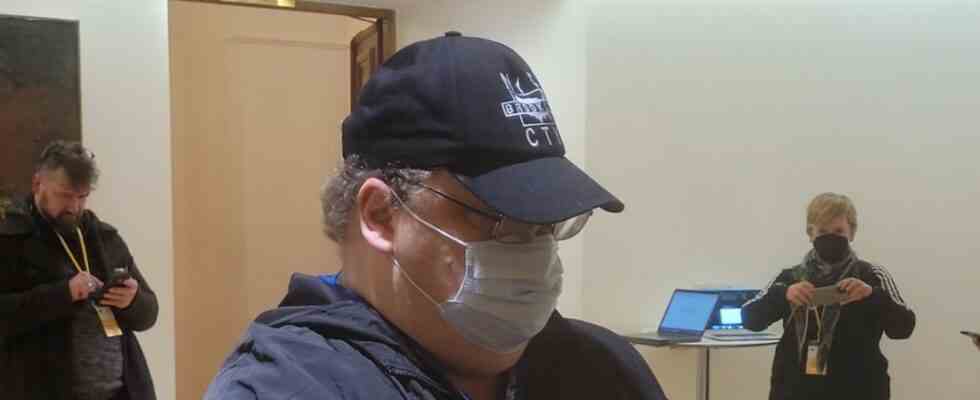The witness comes into the state parliament with a cap pulled low over his forehead and a corona mask, he tries to turn away from the waiting photographers. The NSU investigative committee invited Tino Brandt on Thursday – who played a key role in the right-wing extremist scene in Thuringia in particular, but also in Bavaria in the 1990s. Brandt was considered a leading figure in the scene and drove the establishment of the group “Thüringer Heimatschutz”, in which Uwe Mundlos, Uwe Böhnhardt and Beate Zschäpe were also active.
The 47-year-old was in contact with Mundlos and Böhnhardt by telephone even after the NSU trio went into hiding at the end of the 1990s. And he worked for years as an informant for the protection of the constitution, which was exposed in 2001. The committee hopes that the summons will provide information about NSU connections to Bavaria. Because in the Free State alone, the Nazi cell that was murdering all over Germany killed five men of Turkish and Greek origin, in Nuremberg and Munich. The two men killed themselves in 2011 to avoid being arrested, only then was the NSU exposed. Zschäpe, the only survivor of the trio, was sentenced to life imprisonment in 2018.
The aim of the committee, which has been working for a good six months, is to clarify open questions about the murders and possible mistakes by the Bavarian authorities. In addition, it should be about a conceivable, previously unknown supporter environment and “continuities” to today’s right-wing extremism. With Tino Brandt, after representatives of the authorities and recently the survivor of an attack, a former scene caliber is now taking the witness stand. Although Brandt left the scene, almost involuntarily. Today he has “zero” contacts, he says. At the latest since he was sentenced to five and a half years in prison in 2014 by the Gera Regional Court for sexual abuse of minors in 66 cases, the rest of the scene turned away – this had “to do with the crime, which was child abuse” because it “didn’t fit ideologically “. But since the exposure as an informer, contacts have shrunk. Committee chairman Toni Schuberl (Greens) therefore said that Brandt would be questioned as an “expert from the scene”. On this day there are interesting insights into the life of a neo-Nazi – and that of an informer. But who can or does not want to contribute anything new to the NSU’s contacts in Bavaria.
Brandt had been active in the scene in Thuringia since 1992, previously also in Regensburg and later in Coburg, where he also worked as a salesman in a nationalist publishing house. Among other things, he organized events with the Republican Franz Schönhuber. Before he was unmasked as an informant, he was also deputy head of the NPD Thuringia. As he recalls, he met Mundlos, Böhnhardt and Zschäpe in 1993. Before the Heimatschutz was set up, there were various skinhead groups in Thuringia whose work consisted of “knocking on the nose with leftists”. He then networked, got leaflets, and also said in the local press “that we want to move away from excesses of violence towards a political orientation”. As early as 1994, that was reason enough for the Office for the Protection of the Constitution in Thuringia to recruit him.
When he lived in Coburg, the service repeatedly warned him about upcoming house searches about hate speech, “kindly told me about it”; even if the Bavarian police were involved. Before they went into hiding, Mundlos and Co. were “equal on the road” in the scene, they hadn’t done anything that “had to be respected to the point of collapse”. The scene had collected money for those in hiding, he had organized a concert with a neo-Nazi singer-songwriter in Coburg and passed on the entrance fees. And the game “Pogromly” certainly sold a few times in Coburg, a kind of Holocaust monopoly that was also discussed in the NSU trial. Because of ambiguities about donations, there was “a phone call with the two Uwes”. “I only know three people who went into hiding, what happened after that is beyond my knowledge.” He couldn’t say anything about the inner workings of the later NSU, he didn’t know anything about weapons. To this day he doesn’t believe that the murder trio was actually on the road like that, “I don’t know what was filmed there”.
There had recently been a dispute in the committee about the deletion of possibly NSU-relevant data from security authorities. “Apparently the applicable extinguishing moratoriums in Bavaria were full of holes like Swiss cheese,” the opposition complained. CSU and Free Voters spoke of an unfortunate incident, transparency is guaranteed. Schuberl announced on Thursday that internal consultations had “very well come together” on how to proceed with the data.

